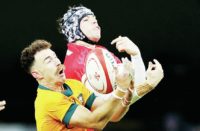 I was surprised when Warren Gatland came out with the view that overseas-based players, especially those in France, could rule themselves out of contention for the 2013 Lions tour. It would have been better for the newly appointed Lions head coach not to have said it. Let’s face it, if there is an absolutely outstanding candidate, a player who has been brilliant for the Lions before, then if they can’t make it onto the plane for Hong Kong, you will still pick them.
I was surprised when Warren Gatland came out with the view that overseas-based players, especially those in France, could rule themselves out of contention for the 2013 Lions tour. It would have been better for the newly appointed Lions head coach not to have said it. Let’s face it, if there is an absolutely outstanding candidate, a player who has been brilliant for the Lions before, then if they can’t make it onto the plane for Hong Kong, you will still pick them.
Take the case of Gethin Jenkins. If Toulon get to the final of the French Championship then he’s duty-bound to play for his main employer, unless he has an exemption written into his contract with the club (which Toulon insist he doesn’t). But if Jenkins wasn’t available to play in Toulon’s biggest game of the season, then why would they employ him in the first place? If Gatland puts himself in Toulon’s position, he would do exactly the same thing as they have in saying that they will not release the player for the Lions until after the final, should they reach it.
The Barbarians game in Hong Kong is a commercial warm-up game, pure and simple – so, if the French Championship final is on the same weekend, you can still afford to pick a high calibre player like Jenkins, even if he cannot be with the Lions for that match and joins them in Australia. That would not be too detrimental, as long as there are not too many latecomers. It is important to include players of quality and experience as long as they are in-form.
It is not great PR to start off by looking at a potential hitch, and by doing so Gatland has opened himself up to questioning at the wrong time. Sometimes it’s better not to bring something up until it happens, and what the overseas player issue highlights is how difficult it is stepping up to become the head coach of the biggest brand in rugby.
There are extra pressures and responsibilities as head coach of the Lions, and you are under the microscope more than you are as a national coach. Become a Lions coach and you will be compared to the other coaches who have gone before you, just as players are. Every reference to the 2013 Lions will give rise to a reference about what happened when they last toured Australia in 2001, or even 1989.
Graham Henry had a very good squad in 2001, but you got some dissension with Matt Dawson and Austin Healey breaking ranks in newspaper columns, and the problems highlighted the coach’s inexperience in the unique Lions environment. There was a split with the internal criticism and leaks, and you just cannot have those factions. I believe that Gatland knows how important it is to keep the Lions as one, and keep those Test spots competitive all the way through. That’s what keeps the whole squad together.
Who Gatland picks as his Lions assistant coaches will be very important. It is inevitable that if he goes with Shaun Edwards and Rob Howley then the coaching set-up will be seen as Welsh, and therefore that every selection decision they make will be scrutinised from that perspective.
I would look towards Edwards as defence/skills coach, and Graham Rowntree as scrum coach, but Gatland’s appointment of an attack coach is crucial.
You have to do it your own way, and if Gatland truly believes that Howley is the best backs coach there is, then he should pick him for the Lions irrespective of where he comes from. Also, Wales aren’t too shabby as an attacking team, and gut instinct says that Gatland will lean towards Howley.
My view is that it would be phenomenal if Joe Schmidt was picked. Schmidt said he wanted to make Leinster the best passing team in Europe, and he’s done that, winning the Heineken Cup twice in succession. If he was confident of doing something similar with the Lions in such a short time frame then he would have a huge impact.
As for the issue of having two Kiwis coaching the Lions, the truth is that it will only be an issue if they lose, because there are not many negatives surrounding a winning tour.
Coaching the Lions is a tough assignment in which everything can be an obstacle – but a good people person, such as Ian McGeechan, usually managed to handle it successfully. However, even Geech couldn’t keep hold of it 100 percent, and he had a bit of a glitch on the 1993 tour of New Zealand – although one hitch in four tours is a fantastic record.
That’s how tough it is, and that’s why the make-up of the touring party sometimes excludes the best player in a position, with the best player for the tour party selected instead. Character, and the will to work for one another, are crucial to a successful Lions tour. In that regard, an after-dinner circuit observation that used to do the rounds was that the success of Lions tours depended on how many Welsh players were on it. I’ve never been sure which way that’s supposed to be taken – as a positive, or a negative.
My guess is that the 2013 Lions tour party will be heavily Welsh, because when you look at the Wales line-up there is hardly anyone you would not consider. In fact, I cannot think of one. And that is a pressure the Welsh players have to handle over this autumn, and in the Six Nations.
Gatland is a successful coach, however it has not all been golden. He has had club success with Wasps winning the Heineken Cup and multiple Premiership titles, and international success with Wales winning two Grand Slams, but there have been a few barren seasons too – and his time with Ireland was indifferent.
He has also joined the ranks of international coaches who say they don’t get enough time with their players, despite everyone in the Northern Hemisphere being in the same boat.
Gatland has also been known to make the odd controversial quote about opposition players and coaches, and it seems to be part of his personality. I hope that he won’t get involved in a war of words with Robbie Deans, if he’s still coaching the Wallabies next summer. As successful as Warren Gatland has been, we never stop learning, and sometimes he must reflect that some of his observations might not have been worth saying.
On a Lions tour it’s unnecessary to inflame the locals and give them any sense of inspiration. Let the players do the talking through the way they play on the pitch.






















